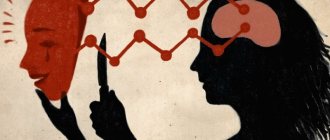If you experience a feeling of vomiting and feel dizzy, then this is a warning bell from the body, which indicates serious illness. Only a doctor can determine the cause of a pathogenic condition. Self-examination and self-medication will not lead to results. Treatment should be carried out using comprehensive measures.
Dizziness (vertigo syndrome) is a feeling during which a person feels that all objects are spinning around him.
Nausea is the stomach's desire to vomit.
What is dizziness?
True dizziness or vertigo is a condition during which patients have a feeling of rotation of surrounding objects around them or a false sensation of their own movement or rotation.
An example of true dizziness, but not in any way related to the disease, is the dizziness that appears in people after riding a carousel, when, after an abrupt stop, they continue to see the movement of surrounding objects relative to themselves, as if the carousel were still in motion.
In most cases, the occurrence of true dizziness is a symptom of diseases of the system of control of balance and body position in space. This system includes the eyes, the vestibular apparatus of the inner ear, and sensory receptors in the human muscles, joints, and bones. Very often, dizziness, which is caused by a disruption in the balance system, is accompanied by nausea and vomiting.
What physiological conditions cause nausea and dizziness?
Physiological causes of dizziness and nausea include hormonal changes that occur in women during pregnancy and menopause. In girls, signs appear with heavy menstruation. The body's sensitivity to moderate blood loss and lack of nutrition play a role.
[node:field_field_doprekl]
Women complain of dizziness, weakness, and staggering when walking. If pain appears in the lower abdomen, you should urgently contact a antenatal clinic and find out the cause.
Vegetative-vascular dystonia is considered by some to be a physiological process, while others consider it to be a pathology. There is no doubt that all symptoms appear in adolescents and children. They are associated with hormonal fluctuations during periods of active growth. Schoolchildren often experience dizziness and fatigue. This also applies to young, impressionable women. No organ disorders were detected.
Dizziness and vomiting are a common reaction of the human nervous system to vibration and body vibrations in transport, in flight, at sea. People call it "motion sickness" or "sea sickness." Signs are accompanied by excessive salivation, headache in the temples, and sweating. Associated with low adaptive function of the autonomic nervous system.
Stressful situations - a normal reaction includes the release of catecholamines, which temporarily spasm the blood vessels of the brain. The condition returns to normal after rest and calming procedures. Hypoxia does not reach threshold values and does not cause circulatory disorders in neurons. With frequent repetition, the nature of the changes is disrupted. Vasospasm causes pathology.
Symptoms other than dizziness
As can be seen from the above, the term “dizziness” has a rather narrow medical interpretation (a false sensation of rotation of surrounding objects or one’s own rotation). But, despite this, people also use this term to refer to other symptoms that are not actually dizziness. So, most often “dizziness” is called such phenomena as:
- darkening in the eyes after abruptly rising to your feet from a sitting or lying position;
- a veil before the eyes;
- feeling of imminent loss of consciousness (fainting);
- weakness, nausea, feeling of confusion and unsteadiness in the legs;
- feeling of unsteady gait and impaired balance.
When a person suffering from dizziness comes to see a doctor, he should describe his condition, how he is feeling and the symptoms he is experiencing as accurately as possible, and not simply say that he suffers from “vertigo.” The further examination and treatment plan will depend on the accuracy of the description of the existing symptoms.
In contrast to true dizziness, which appears due to a disruption in the functioning of a person’s balance system, false dizziness, which patients describe as a feeling of weakness, instability, darkening in the eyes, blurred vision, etc., can most often be a sign of anemia, chronic fatigue , hypovitaminosis, hypotension and vegetative-vascular dystonia. In addition, fainting, episodes of lipothymia (a sharp decrease in muscle tone with great physical stress) and short-term attacks of epilepsy can also be confused with dizziness.
We pay special attention to attacks of sudden dizziness and weakness in people who have diabetes. In this category of patients, dizziness and weakness may indicate a dangerous decrease in blood glucose levels.
Not frequent dizziness
Let's consider situations and diseases in which such symptoms may occur. Dizziness may not be systematic. but only a rare effect. However, this may be a signal of serious illnesses or developing pathologies.
Presyncope
In this state, which lasts no more than a few seconds or minutes, it seems to a person that surrounding objects are moving, he feels hot, sweats profusely, feels nauseous, his eyes become cloudy, vision may even disappear, and the person becomes pale. Presyncope usually occurs when the patient is sitting or standing, but not lying down. The cause may be orthostatic hypotension (a decrease in pressure after moving from a horizontal to a vertical position), arrhythmia and vasovagal crisis (excessive activity of the vagus nerve, leading to a decrease in heart rate).
Mental disorders
Depression, anxiety or panic disorder, alcohol addiction or personality disorder can lead to non-systemic dizziness. For example, if a person, in addition to this symptom, also has shortness of breath, rapid heartbeat and sweating, then most likely we are talking about a panic attack. A psychiatrist works with all these conditions.
Damage due to medication
Some aminoglycosides (for example, gentamicin) can be toxic to the vestibular system: they damage the hair cells of the inner ear, provoke imbalance and cause oscillopsia (the illusion of vibration of surrounding objects) when moving the head. This condition can become chronic.
Antiepileptic drugs, sedatives, and tranquilizers can also cause non-systemic dizziness. Sometimes blood pressure-lowering medications are too effective and blood pressure drops to abnormal levels, causing symptoms similar to dizziness.
Acoustic neuroma
When walking, a person begins to sway, surrounding objects move, his hearing may also deteriorate, and tinnitus may occur - these are the main symptoms of an acoustic neuroma (benign neoplasm). In most cases, such patients are prescribed surgery or radiation therapy.
Stranding syndrome (sea sickness on land)
After traveling on water, in very rare cases, a person may develop this syndrome: the patient feels that he is losing his balance, he is swaying, it seems to him that he is walking on uneven ground. This condition usually goes away within a couple of days. However, in more severe cases, your doctor may prescribe benzodiazepines or the antiepileptic drug clonazepam.
Non-systemic dizziness can also be caused by anemia (accompanied by fatigue, weakness and pallor), hypoglycemia (low blood sugar, which may be manifested by sweating and confusion), inflammation of the ear, heat stroke or dehydration.
How does the human balance system work?
In most cases, true (central, systemic) dizziness is a manifestation of various diseases of the system that provides balance and control of body position in space. This system consists of the following 3 components:
- The vestibular apparatus, which is located deep in the skull, where sensitive receptors are located that respond to the angular or linear acceleration of the body in space.
- Eyes that provide visual information about the location of the body and its parts in space, as well as in relation to other objects.
- Sensitive receptors (proprioceptors) that are found in human bones, joints, muscles and ligaments. They provide reliable information about the position of body parts in space, as well as relative to each other.
All these 3 components of the balance system simultaneously send information to the brain, where it can be analyzed and processed into a person’s idea of his position in space and relative to other objects.
If for any reason the data that comes from one of the sources is distorted (for example, irritation of the receptors of the vestibular apparatus by an inflammatory reaction when there is no movement and acceleration), then an incorrect idea is created in the brain about the position and movement of the human body in space . Then an illusory sensation of movement or rotation arises, when in reality the body is motionless.
The causes of a disorder in a person’s balance system can be very different. Nowadays, more than 80 diseases are known that can cause dizziness. Below we describe the most common causes of dizziness.
How does the syndrome occur?
Dizziness is an unpleasant feeling of lack of stability of surrounding objects; they are perceived as rotating or moving, while a person loses balance, cannot move confidently, or distinguish direction and goals.
It manifests itself in patients when turning the body, bending down (“dizzy”), in the form of attacks of dizziness with nausea and vomiting. A complex system of the vestibular apparatus is responsible for the correct perception and assessment of movements. Its center is located in the cerebellum. But the assessment depends on the state of information coming through special nerve fibers from the sense organs.
Therefore, the “culprits” of dizziness may be:
- central link - in case of damage to the cerebellum caused by diseases of the brain;
- peripheral - if vision is impaired, the vestibular nerve and inner ear are involved in the pathology.
In addition, dizziness is distinguished:
- physiological - there is no pathology of the vestibular apparatus, they arise due to hunger (a drop in blood glucose levels), a stressful situation (a consequence of the release of adrenaline and cerebral vasospasm), motion sickness in transport, overwork;
- systemic (pathological) - always caused by a disease with damage and disruption of the functioning of the cerebellum, the parts that make up the vestibular apparatus, vision, and muscles.
..
Nausea also has central and peripheral causes. The main vomiting center is located in the medulla oblongata. Receiving signals through internal pathways, at a subthreshold level of irritation it causes not vomiting, but a feeling of its approach.
The brain receives influence on the central zone through the ascending nerves, from the blood, depending on the composition of hormonal levels, glucose and other substances. Toxins and unremoved waste irritate the center and contribute to nausea and vomiting.
Local causes are changes in the acidity of gastric juice, the accumulation of a large volume of undigested food, pain from ulcers and cancer. In this case, the body tries to free itself from overirritation and cleanse the stomach with the help of vomiting.
The causes of nausea and dizziness are associated with the common blood supply to the cerebellum and medulla oblongata. Disturbance in the supply of neurons with oxygen and nutrients during ischemia leads them to a state of hypoxia, the cells are not able to synthesize energy, and the content of electrolytes is disrupted.
As a result, various types of cerebral circulatory insufficiency are clinically manifested with attacks of dizziness, headache, nausea and vomiting, drowsiness, and transient disturbance of consciousness.
Symptoms of dizziness and nausea are a serious component of many neurological diseases, which are the consequences of circulatory disorders in the brain during hypertensive crises, a drop in blood pressure during states of shock.
The desire to achieve weight loss through starvation diets often ends in anemia and the need for treatment
Dizziness: the most common causes and forms
According to modern research, most often this disease is a symptom of diseases such as:
- BPPV (benign paroxysmal positional vertigo);
- basilar migraine;
- psychogenic dizziness;
- Meniere's disease;
- osteochondrosis of the cervical spine, as well as vertebrobasilar insufficiency;
- vestibular neuritis;
- brain tumors.
Note that BPPV accounts for more than 80% of cases of true dizziness. Below we will consider the main diseases that are accompanied by dizziness, and also describe the characteristics of dizziness in each case.
1. Benign paroxysmal positional vertigo is one of the most common forms of true vertigo. The name itself is deciphered as follows: “benign” means a favorable, harmless course of the disease, “paroxysmal” means the sudden onset of dizziness; “positional” - the appearance of dizziness when turning the head in a certain direction.
The reason for the development of BPPV is irritation of the receptors of the vestibular apparatus by otolith stones, which are located in the semicircular canals of the inner ear. This disease can also occur spontaneously in a person of any age, but in most cases it appears in people over 50-60 years old, after an injury or infection.
The main symptoms of benign positional vertigo are:
- the occurrence of severe dizziness when tilting or turning the head, when turning in bed, when throwing the head back;
- severe dizziness lasts from several seconds to several minutes, and it may be accompanied by weakness, severe nausea or vomiting;
- attacks of dizziness can appear in series, after which they disappear without a trace for some time.
Treatment of BPPV is carried out with a special exercise, and always under the supervision of a neurologist. Its duration is only 1-2 minutes, and its effectiveness reaches 90%.
2. Dizziness with migraine. Migraine is one of the most common types of headaches. In some cases, during a migraine attack, blood circulation is disrupted in the areas of the brain that control the functioning of the vestibular apparatus, which causes severe dizziness, after which a severe headache in the back of the head may immediately develop, imbalance may occur, vomiting, noise and light intolerance may occur. . Some people with migraines may only have severe dizziness and nausea, but no headache. In children, one of the precursors of migraines in adulthood are attacks of severe dizziness, imbalance, nausea, vomiting, which over time turn into typical migraine attacks.
3. Psychogenic dizziness ranks second in prevalence after BPPV. But unlike it, psychogenic dizziness is not true dizziness, since it is not associated with disturbances in the functioning of the vestibular apparatus.
The main characteristics of this disease:
- description of dizziness as a feeling of fog in the head, confusion, fear of falling and losing consciousness, but not as one’s own spinning or other objects;
- attacks of dizziness occur spontaneously, often under stress, in a confined space (transport, elevator), as well as in crowded places;
- in addition to dizziness, patients have other complaints that resemble some diseases of the internal organs: a lump in the throat, soreness, pain in the chest, abdomen or in the heart area, pain and tension in the muscles, a feeling of lack of air, a feeling of tension and internal fear, anxiety, irritability, anxious sleep, strong and unreasonable concern about one’s own health, as well as the health of loved ones, etc.
Psychogenic dizziness can also be considered one of the most common manifestations of VSD (vegetative-vascular dystonia). Particularly often, attacks of false dizziness can be observed in patients with anxiety disorders and panic attacks.
Determining the psychogenic nature of dizziness plays a big role in determining the correct treatment, so if you have an idea that dizziness in your case may be psychogenic, we recommend that you study information about vegetative-vascular dystonia, as well as its treatment.
In particular, with psychogenic dizziness, treatment that is intended for VSD (sedatives, psychotherapy) will be much more effective than specific drugs for dizziness, prescribed for all cases of true dizziness.
4. Dizziness with Meniere's disease. This disease is characterized by periodic attacks of severe dizziness and deafness (usually in one ear), gradually leading to hearing loss.
At the moment, the exact cause of Meniere's disease is still unknown. But there are suggestions that in some cases it may be caused by injury, viral infections or allergies.
A typical manifestation of Meniere's disease is an acute attack of severe dizziness, which lasts several hours or days and is accompanied by nausea, vomiting, tinnitus, hearing loss (in one ear) and a feeling of pressure inside the ear.
Typically, attacks of this disease appear one after another over several weeks, after which they disappear for some time, but then begin again.
5. Dizziness due to osteochondrosis, as well as vertebrobasilar insufficiency, neck and head injuries. As we have already said, the work of the human balance control system involves sensitive receptors of the muscles, bones, joints, ligaments of the whole body and mainly the muscles, bones and ligaments of the neck.
Degenerative diseases of the cervical spine, including osteochondrosis, are one of the most common causes of dizziness, which patients often describe as unsteady gait and rarely as a feeling of spinning.
Osteochondrosis of the spine disrupts the functioning of the sensory receptors in the neck, and can also cause disruption of blood circulation in the vertebral arteries, which supply blood to the parts of the brain responsible for balance and maintaining the body, located in the brain stem.
Chronic circulatory disorder in the lower parts of the brain (vertebrobasilar system) is called vertebrobasilar insufficiency. Atherosclerosis of the neck vessels and long-term hypertension (increased blood pressure) also play a certain role in its development. Most often, vertebrobasilar insufficiency occurs in older people. In addition to dizziness, it is accompanied by symptoms such as memory loss, headaches (mainly in the back of the head) and tinnitus.
Attacks of acute circulatory disorders in the vertebrobasilar region can manifest as severe dizziness, loss of consciousness, vomiting, weakness and double vision.
Injuries to the head and cervical spine (especially after car accidents) can also cause dizziness. In such cases, it is usually more pronounced in the first days after the injury and gradually decreases as the patient rehabilitates.
6. Dizziness with vestibular neuritis. This disease is an inflammation of the vestibular nerve, which carries impulses from the receptors of the inner ear to the brain. When the vestibular nerve becomes inflamed, it temporarily loses its ability to conduct impulses. This, in turn, is manifested by severe dizziness, unsteady gait, nausea and vomiting.
The main cause of vestibular neuritis is viral infections, so attacks of associated dizziness may be accompanied by weakness, fever, cough or runny nose.
7. Dizziness due to brain tumors. Some brain tumors that are located near the inner ear can cause severe and progressive dizziness.
Symptoms of a tumor, in addition to dizziness, may include the following phenomena:
- hearing loss (usually one ear);
- nausea;
- tinnitus, hearing loss;
- headache;
- the appearance of strabismus, paralysis of the facial muscles.
Dizziness as a symptom of a brain tumor is most often observed in young people and children.
Why are you girls...?
Let us also highlight the causes of dizziness, which the fair sex provokes with their unreasonable attitude towards their own body, and ultimately – towards their health:
- Constant dieting or a sudden transition to a strict diet. The head then begins to simply feel dizzy from hunger. Weakness and thinness accompany such lovers of slimness. It happens that overweight girls and women do not plan to become “prisoners of Auschwitz”, but only want to lose weight to a normal size, but they may not calculate the body’s capabilities, and it actively signals hunger with dizziness and resists the new low-calorie regime.
- Wearing tight clothes, corsets. In past centuries, women often fainted because most ladies wore corsets. Today, real corsets are not so common, but they are made to order. Craftswomen are proud that their clients are tightened... by a couple of tens of centimeters! No wonder this makes some people dizzy. There are also all kinds of shapewear. Safe when worn according to manufacturer's recommendations. But some people get carried away and squeeze into something that is not the right size. The result is that blood circulation is impaired and you feel dizzy.
I pulled myself into a corset and felt dizzy.
Also problems
And there are, although not one hundred percent female causes of dizziness, but it is the fair sex who are more susceptible to them.
- Vegetovascular dystonia. The diagnosis that doctors in the post-Soviet space like to make. Equates to: it’s unclear why you’re feeling dizzy. Often you just need to “dig deeper” and then the problems recognized by the World Health Organization will come to light. The same hormonal imbalance, for example. For women, this is fraught with infertility.
- Psychological problems. Women in the modern world are equal to men, but... sometimes they take on more than they can, but still worry strongly like women. Some may experience very real health problems. Girls, believe me, it's not worth it!
Dizziness during pregnancy
False dizziness (a feeling of weakness, instability, near fainting) is very often observed during pregnancy. Attacks of dizziness in such cases are usually associated with hypotension, as well as a decrease in blood glucose concentration. We bring to your attention the following recipe, which is an effective method of treating dizziness during pregnancy:
In a mug of warm, boiled water, you need to dissolve 1-2 tbsp. l. sugar and drink immediately after waking up or before leaving the house.
Pregnant women (especially during the first half of pregnancy) should always carry water with them, and at the first sign of dizziness, try to drink as much as possible.
Dizziness and weakness
Dizziness and weakness can occur in many cases. This condition does not always mean that you are sick. Thus, in adolescence, weakness and dizziness are explained by hormonal changes. The autonomic nervous system is being rebuilt and growth rates are accelerating. Against this background, weakness, dizziness and even fainting are possible. Also, dizziness and weakness are typical during pregnancy.
If the cases mentioned do not apply to you, dizziness and accompanying weakness most likely indicate some kind of pathology. Weakness and dizziness are most often observed with:
- anemia (low hemoglobin content in the blood);
- cerebrovascular accident. In this case, tinnitus, decreased attention, and the appearance of black spots before the eyes may also occur;
- a sharp increase in blood pressure (hypertensive crisis). In this case, dizziness and weakness may be accompanied by a headache;
- neurocirculatory dystonia;
- oncological diseases.
Cases when you should consult a doctor immediately
You should consult a doctor as soon as possible in cases where dizziness is accompanied by the following symptoms:
- increased body temperature;
- persistent vomiting;
- severe headache, weakness of arm or leg muscles;
- severe dizziness lasts more than an hour;
- during an attack of dizziness the person lost consciousness;
- when dizzy, the patient fell and was seriously injured;
- A patient with diabetes mellitus and hypertension developed severe dizziness.
Causes of dizziness, diagnosis and drug treatment
Dizziness is a common complaint with which patients consult a doctor.
The treatment of dizziness, diagnosis and prevention of this condition will be discussed further. Types of dizziness:
- physiological;
- central;
- peripheral;
- systemic.
In terms of intensity, dizziness can be mild or severe. In the first case, the cause of this condition may be sedentary work, a sedentary lifestyle and a sudden change in body position. Severe dizziness occurs with various injuries and diseases of certain body systems. The doctor will be able to identify the cause and prescribe a course of treatment after a physical examination and consultation with specialized specialists.
Diagnosis of dizziness
Diagnosis and treatment of dizziness is carried out by neurologists, vertebrologists, otorhinolaryngologists and ophthalmologists. In order to clarify the cause of dizziness, as well as prescribe the correct treatment, a patient with dizziness must undergo a series of examinations:
- Doppler ultrasound of the main arteries of the head;
- examination by an ophthalmologist;
- audiographic examination;
- CT (computed tomography) or MRI (magnetic resonance imaging);
- X-ray of the skull and cervical spine.
Diagnostic methods
To understand why the patient feels sick, sick, and dizzy, a full examination should be performed. Various techniques are aimed at identifying hidden pathologies that require specific treatment. During the initial examination, the doctor collects medical history data. It is important to describe in as much detail as possible under what conditions the headache begins, how often attacks occur and how long they last. To confirm the diagnosis, the following techniques may be needed:
- first of all, measuring blood pressure; the patient is also recommended to monitor it at home;
- tests to check balance, including the Romberg test (deterioration in coordination of movements is manifested by staggering in a standing position, with eyes closed, feet shifted and straight arms extended forward);
- a general blood test will indicate inflammatory processes, as well as various types of anemia;
- blood test for glucose levels;
- heart examination, which includes ultrasound diagnostics and electrocardiogram;
- tests to assess hearing and visual acuity;
- X-ray of the cervical spine;
- study of blood flow in the vessels of the neck and head - a contrast agent is used for this;
- electroencephalography - analysis of the bioelectrical activity of brain cells;
- computer or magnetic resonance imaging is the most accurate, informative way to examine the brain, including soft tissues and blood vessels, which allows you to obtain a complete image of the affected area.
At the Clinical Institute of the Brain, you can undergo a complete diagnosis and determine the causes of nausea, dizziness, and headaches. The regimen is selected individually, based on the results of the initial examination of the patient. An experienced doctor will prescribe only those studies and tests that will determine the nature of the pathology. This is the most important stage in solving the problem, since the diagnostic results allow you to select the most effective treatment regimen.
First aid at home
There are several ways to relieve a short-term attack:
- ventilate the room;
- lie down on a flat surface, and it is recommended not to make sudden movements of the head;
- if possible, place a cool compress on your forehead;
- when in a public place, try to find a secluded corner to sit down, take a couple of sips of plain water, close your eyes and lightly press on your eyelids;
- after the attack has subsided, spend 5–10 minutes in a resting position; when getting up, do not make sudden movements, so as not to provoke a new wave of vertigo.
When urgent medical attention is needed
When vertigo appears along with symptoms such as:
- darkening of the eyes;
- stuffiness and pain in the ears;
- nausea;
- headaches;
- fainting;
- nosebleeds;
If you have had isolated attacks, or the unpleasant condition occurs systematically, then the only correct decision is to immediately consult a doctor. The doctor will conduct a diagnosis and identify the cause of the ailment, only then can we talk about prescribing the correct treatment.
When are nausea and vomiting not associated with diseases of the nervous system?
Doctors of any profile have to deal with symptoms such as nausea and dizziness. They are caused by general pathology. Among diseases of the cardiovascular system, it is necessary to note neurocirculatory dystonia in adolescents, true and symptomatic hypertension. High blood pressure is manifested by hypertensive crises.
The patient has:
- headaches in the back of the head, temples, vertex of a pulsating nature;
- dizziness and nausea;
- feeling of chills and muscle tremors;
- flickering of flies before the eyes;
- possible bleeding from the nose;
- feeling of lack of air;
- stitching and pressing pain in the region of the heart.
Crises also occur at significantly lower pressures
Injuries to the head and spine cause vestibular disorders of varying degrees, from short-term crises to persistent dizziness. Depending on the severity of the injury, life-sustaining areas of the brain may be damaged.
Endocrine diseases are often accompanied by similar symptoms in a state of hypoglycemia (a drop in glucose in the blood of a patient with diabetes mellitus) and impaired thyroid function.
In the practice of an otolaryngologist, labyrinthitis often occurs as an inflammation of the middle ear. In addition to pain, hearing loss, and purulent discharge from the ear canal, it is manifested by dizziness and nausea. An ophthalmologist, when examining the organs of vision, discovers the cause of dizziness in weakness of the eye muscles. This causes flashing before the eyes.
Lack of fruits and meat products in food contributes to the development of anemia (anemia). The disease also develops with pathology of the stomach and intestines, which does not allow the absorption of substances supplied with food. The brain does not have enough calories to replenish energy reserves. Therefore, patients experience nausea and dizziness.
Food poisoning and exposure to toxic toxic substances that enter the blood through the digestive organs directly suppress brain function. A similar effect is caused by taking alcohol and drugs. Signs of intoxication include:
- abdominal pain (in the epigastric region, along the intestines);
- vomiting with bitterness in the mouth, indicating duodenogastric reflux (return of food mass from the duodenum and stomach);
- diarrhea;
- temperature increase;
- weakness.
The cause of poisoning may be storing food in the refrigerator along with meat, or using the same knives and boards
Sudden dizziness: 5 simple reasons
Typically, loss of communication between the brain and the vestibular system is rare and does not last long.
Dizziness that occurs is not considered a pathology in the following cases:
- Ride the carousel. Such entertainment creates a serious load on the vestibular apparatus. And if it is naturally weak and untrained, then it may well fail. Such dizziness usually occurs in women, since they also have psycho-emotional experiences added to the load.
- Stress, anxiety. If dizziness occurs during a speech in front of a large audience or after a reprimand from a boss, then the cause of vertigo is the production of a large amount of adrenaline. This hormone causes vasospasm. And this leads to a temporary deterioration in blood flow in the brain.
- Climbing to heights. In this case, the unpleasant phenomenon is also considered a physiological norm. When rising to a height, a person’s eyes cannot quickly focus on distant and close objects. Abrupt switching between objects causes dizziness.
- Hunger. Similar problems are common to all fans of strict diets. If a person does not receive enough nutrition, then a glucose deficiency occurs in his body. The absence of the main “fuel” leads to deterioration of brain function and the appearance of dizziness.
- Active exercises. Exercise enthusiasts should remember moderation. Excessive exercise can cause low blood pressure. This leads to dizziness and sometimes fainting. The unpleasant condition may be caused by unsuccessful sudden movements of the head, as a result of which the blood supply to the brain is disrupted.
An attack of dizziness may occur in response to taking certain medications. The most common sources of unpleasant symptoms are NSAIDs, antidepressants, antibiotics, and cancer medications. If your head is “turned” by medications, be sure to consult a doctor to change the drug.
Disease Prevention
It is not always necessary to carry out special drug treatment; sometimes it is enough to simply adjust your lifestyle. Prevention measures:
- watch your diet - food should be healthy, varied and balanced;
- try to give up bad habits;
- if your work involves a computer, take short breaks every hour to give your eyes a rest;
- walk outdoors more often;
- observe the rest and work schedule;
- after a hard day at work, take a cool shower to restore energy and relieve fatigue;
- Dedicate 10 to 15 minutes of free time every day to perform the exercise.
I note that not only antibiotics from the aminoglycoside group have a high ototoxic effect, but also cytostatics (Methotrexate) and anti-tuberculosis drugs. Aspirin is slightly less toxic to the organ of hearing and balance. Next to reduce possible harmful effects are loop diuretics (Lasix, ethacrynic acid), macrolides (Azithromycin, Clarithromycin) and fluoroquinolones (Ciprofloxacin), as well as painkillers (Indomethacin, Naproxen and Lidocaine). Taking the above medications may cause attacks of dizziness. If alarming symptoms appear, you should immediately consult a doctor.
Victoria Druzhikina
Neurologist, Therapist
Main neurological causes
In the medical science of neurology, a large layer is devoted to the problem of the vestibular apparatus, since dizziness is most often due to damage to the nervous structures. Let's look at the main causes of dizziness, which are most often diagnosed in women:
Inflammation of the vestibular apparatus
Usually occurs as a complication of a viral infection. It mainly affects women aged 30-35 years. They suddenly develop severe dizziness, which is accompanied by sweating, palpitations, and general weakness. In such cases, an urgent consultation with an ENT doctor, a neurologist and the prescription of anti-inflammatory drugs are necessary.
Toxic effect of aminoglycoside antibiotics on the inner ear
Problems with visual perception may also occur during treatment with gentamicin, tobramycin, or kanamycin. Along with it, tinnitus and hearing loss may appear.
If symptoms of the toxic effects of antibiotics appear, you must stop taking the drugs and immediately consult your doctor, because such changes are irreversible.
Tumor or metastases in the cerebellum, vestibular nerve, brain stem
Unpleasant sensations in the head may be accompanied by a bursting headache, nausea, episodes of loss of consciousness, and impaired coordination of movements. If a tumor is suspected, the doctor performs an MRI or CT scan of the skull and refers the woman to an oncologist. If cancer has been detected, further tactics depend on the nature of the tumor and its location. Treatment uses chemotherapy, radiation therapy, and surgery.
Temporal lobe epilepsy
This is a special type of disruption of the cerebral cortex, in which the processes of excitation and inhibition change. With some periodicity, the temporal lobe cortex becomes overexcited and produces attacks of dizziness. It is accompanied by abdominal pain, drooling, sweating, and slow heart rate.
The main symptom of epilepsy is the seizure-like course of the disease. During a calm period, a woman feels completely healthy, but under the influence of some events or out of the blue she begins to feel dizzy. This pathology requires contacting a neurologist, who records brain activity on an EEG and prescribes appropriate treatment.
Migraine
One of the most mysterious types of headaches. It is called the “disease of geniuses”, since the relationship between a person’s outstanding mental abilities and painful attacks of the disease has long been noticed. With a migraine, the head may hurt in the forehead and eyes.
The woman needs consultation with a neurologist and treatment with anti-migraine drugs. To alleviate the condition of migraine patients, diets, physical exercises have been developed, massage and other relaxing procedures are recommended.
Encephalitis
This is an inflammation of the brain that affects the balance centers and the cerebellum. It is usually infectious in nature, but can also be toxic. If the cause is an infection, then the woman has pain and dizziness, severe weakness develops, body temperature rises to 38-40 degrees C, convulsions, blurred vision, and loss of consciousness are possible.
Encephalitis requires emergency hospitalization in a neurological or infectious diseases hospital.
Stroke
There is a sudden cessation of blood supply to an area of the brain. If the affected area is small and affects the centers of balance, then the woman’s only symptom will be dizziness. It is permanent, does not depend on the position of the body and head, the patient cannot move normally and maintain balance. Additional hearing loss or hearing loss may occur.
The patient requires emergency hospitalization in a neurological hospital. Therapy started within the first 2 hours after a stroke stops the death of nerve cells. The changes are partially reversible - a few months after the attack, the woman’s condition improves significantly.
Doctor's advice
There is a dietary supplement that works - Huato Boluses. Or the nootropic Divaza. This is something that has been tested on patients many times. It is taken either this or that (Divaza is cheaper) in a course (Divaza up to three months without a break, Huato Boluses are taken for 10 days, then a break is taken for one day and again for 10 days and so on up to three times) to prevent headaches, and not as an analgesic , i.e. in a moment of pain. Be healthy!
Victoria Druzhikina Neurologist, Therapist
Multiple sclerosis
This is an autoimmune disease in which the patient's antibodies attack her own nerve fibers and destroy them. The disease begins at a young age, is asymptomatic for some time, and then individual signs of trouble appear.
One of them may be constant dizziness, resistant to treatment and gradually progressing. A neurologist treats such patients; he prescribes drugs that suppress the activity of the immune system.
Lack of carbohydrates in the diet
Neurons require a huge amount of glucose to function, so women or athletes who are losing weight during the drying period may experience constant dizziness. In this case, it is necessary to increase the dose of carbohydrates until the condition normalizes.
Severe atherosclerosis of the vessels supplying the brain
This is one of the leading reasons why women over 50 feel dizzy. As a rule, menopause occurs during this period, and the level of the sex hormone estrogen in the blood decreases. It stops protecting the vascular wall from damage and lipid deposition, so after some time atherosclerotic plaques form in it.
The plaque bulges into the lumen of the vessel and significantly narrows it. Blood flows with difficulty, and the supply to the brain deteriorates, which is manifested by constant dizziness, tinnitus, headaches and blurred vision.
If such problems occur, you should consult a therapist who will prescribe medications to reduce the concentration of lipids in the blood and improve blood flow. Without treatment, atherosclerosis often results in a stroke.
Anemia
Anemia is a lack of hemoglobin in the blood and a decrease in its oxygen capacity. Oxygen is another essential component for the functioning of nerve cells; they absorb it intensively and in large quantities.
Even a slight decrease in oxygen concentration in the blood leads to drowsiness, increased fatigue and dizziness.
An anemic woman has pale skin and perverted taste preferences: she wants to eat raw meat, a piece of chalk or earth, she likes the smell of gasoline, lime, paint. Representatives of the fairer sex lose blood every month during menstruation and, if they do not receive enough iron from food in the form of meat, buckwheat, apples, anemia develops.
The listed symptoms are a reason to consult a general practitioner for examination and treatment.
VSD
VSD - vegetative-vascular dystonia develops for various reasons, including due to constant stress, physical. stress, mental suffering, etc. In addition to vertigo, patients often feel cold, as the circulatory system suffers, they get tired quickly and have problems sleeping.
Osteochondrosis
Osteochondrosis is a pathology that develops in people who spend a lot of time in a “sitting” position, due to which the neck is under constant tension and the vertebral vein is compressed between the cervical vertebrae. As a result, cerebral circulation is disrupted and less oxygen enters the brain, the lack of which leads to various disorders, including loss of stability and disorientation in space.
Multiple sclerosis
Multiple sclerosis is a disease characterized by the occurrence of attacks of varying duration, during which the patient experiences dizziness, unsteadiness of gait, instability, numbness of the limbs, difficulty urinating, etc.
PMS
PMS - heavy periods and lack of iron very often provoke dizziness in women. If you often encounter this problem, then visiting a gynecologist is simply necessary. The specialist will prescribe hormonal contraceptives or iron-containing vitamins to normalize well-being during PMS.
Severe stress
Severe stress - hard work, constant nervous and physical fatigue, family quarrels, mental trauma, etc. lead to a loss of vitality and general malaise of the body. The help of a psychologist will help you cope.
Pathology of the vestibular apparatus
Pathology of the vestibular apparatus is most common in women with underweight and develops at a young age (from 25 years). Patients are constantly sick in any type of transport; even ordinary rides on attractions end in a severe attack of vertigo.
Hypotension
Chronic hypotensive patients with low blood pressure begin to feel dizzy, especially with sudden movements, getting out of bed, or active physical work. The patient additionally experiences headaches, spots appear in the eyes, and vision deteriorates at the time of the attack.
Dizziness in pregnant women
Pregnancy is a completely new qualitative state of a woman, which is accompanied by significant changes in the body. The concentration of progesterone in the blood increases sharply: this sex hormone is necessary for bearing a fetus. It affects not only the uterus, but also the entire woman’s body.
Progesterone reduces pressure in arterial vessels, which reduces blood flow to the brain. In the early stages, he does not have time to adapt to new working conditions and sometimes reacts with headaches and dizziness.
A pregnant woman may feel dizzy for another reason, which also leads to partial starvation of the brain. The blood supply to the fetus requires a large volume of blood, so the amount of fluid in the mother’s vascular bed increases. In the early stages, it significantly dilutes hemoglobin, and the oxygen capacity of the blood decreases. The brain has to work in conditions of oxygen starvation, to which it immediately reacts. Subsequently, a healthy woman’s iron reserves are used, the release of red blood cells increases, and brain nutrition is improved.
What we must not forget
Symptoms can be caused by the child overheating in the heat or sunstroke on the beach. In elderly people, under the influence of vascular atherosclerosis, chronic cerebral insufficiency, and previous diseases, vestibular disorders are formed:
- staggering when walking;
- attacks of nausea;
- short-term loss of consciousness and orientation;
- decreased memory and attention;
- hearing and vision impairment;
- change of character.
These symptoms must be taken into account when organizing care for the elderly.
When identifying the causes of dizziness and nausea, an important role is played by the negative effects of medications. Therefore, the doctor needs to be informed about all medications and folk remedies that the patient is taking. Each person has their own sensitivity; it is impossible to predict the reaction to treatment in advance.
If dizziness and nausea occur, you should stop taking it and seek medical advice. The most common causes of vomiting are antibacterial, anticonvulsant, antihypertensive, sedatives, sulfonamides, and cardiac drugs.











